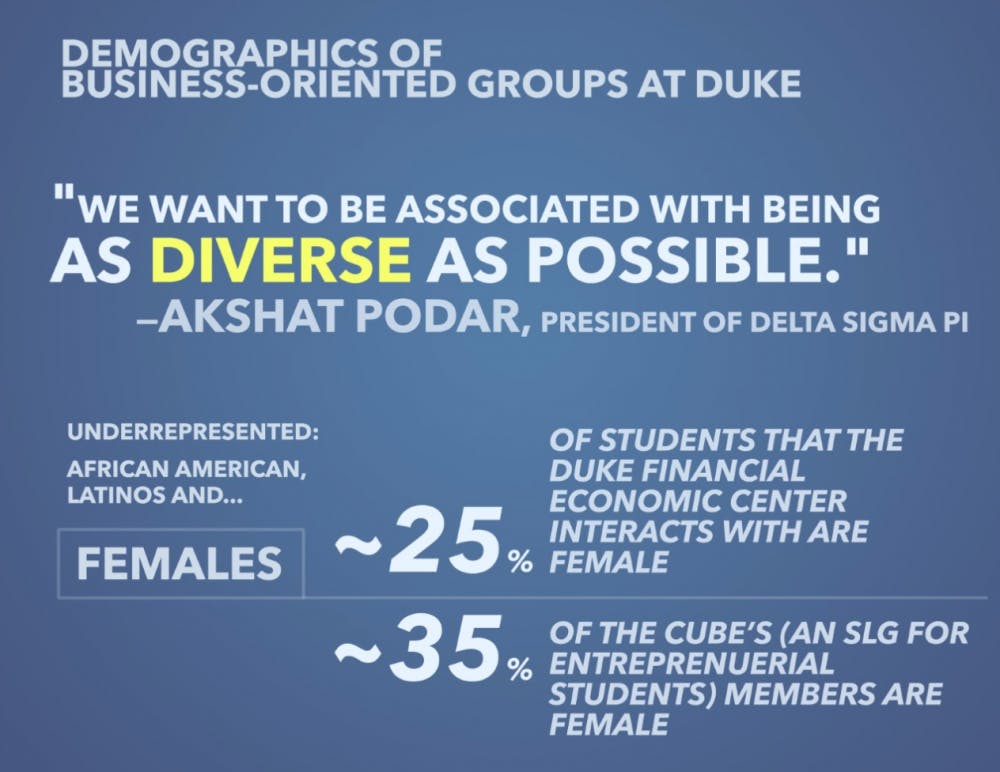Several of Duke's business-oriented student groups expressed concerns with their racial, gender and academic diversity.
Many of the groups interviewed noted that their students can be disproportionately male, Caucasian or Asian and economics or computer science majors. The groups currently use a range of methods to increase diversity—such as providing information on non-finance and non-consulting pathways, reaching out to as many people as possible and considering diversity during recruitment.
Presidents of the Duke Business Society, a business-oriented group for undergraduates, and Delta Sigma Pi, a professional business fraternity, said diversity is a focal point of their recruitment process.
“We believe that the club will be much more effective and valuable to its members if we have diverse viewpoints within the club,” said senior Felipe Concha, president of the Duke Business Society. “With that in mind, when we are going through interviewing and recruiting process, we try to look for a diverse group of students on campus. Of course, diversity doesn’t just mean race or gender, but also career aspirations.”
Senior Akshat Podar, president of Delta Sigma Pi, which was founded in 2013, said that the group's changing racial makeup is important to its future direction.
“I would also say that the racial blend has become more diverse over the years,” he said. “When we started, we had more Asians, but now we have integrated more white people as well. Going forward, we’re trying to attract minorities such as Latinos and African Americans. We want to be associated with being as diverse as possible.”
Some of the other groups The Chronicle interviewed also addressed the issues of diversity, but at the same time said they were not necessarily targeting any particular kind of person to join.
"I’m not really looking for a certain kind of person to join. I think it’s more that I feel uncomfortable with the idea that some people see us as an Asian organization," said senior Eileen Yao, president of the business society Scale and Coin. "That’s not really the purpose. It’s more to educate people and show people what’s out there. So, I want people to feel more comfortable joining us as not necessarily Asian. I don’t think I’m seeking out a certain kind of person."
Yao also mentioned that the group aims to draw students who are not just interested in finance and consulting. Her group has an equitable gender ratio, she said.
The Cube, a selective living group for entrepreneurial students that tends to draw computer science and economics majors, is mostly made up of students with East Asian and Indian backgrounds and is about 65 percent male. Sophomore Brian Jiang, president of the SLG, explained that the group is also looking to broaden their scope of interest from just start-ups to other areas of business.
"As I mentioned beforehand, we're not really trying for specific things. We're mainly a core interest," Jiang said. "As long as you have interest in anything startup related or have any ideas, we're really open to having you join. And we aren't really pursuing any specific breakdown, although we voted for recruiting a stronger female population."
Another popular organization is the Investment Club, which manages a $50,000 portion of the Duke Endowment in coordination with the Duke University Management Company. Through its open-to-all house course on the basics of finance, senior Travis Wolf, the group's president, stressed that it is an open resource for all students interested in finance.
“We draw students from all over, to be honest,” Wolf said. “I remember when I got into the club in my freshman year, I was surprised. The president was economics and computer science, and there was also an electrical engineer who just loved investing. Although I think that if you looked at it, a lot of the students are economic majors.”
When asked if the group's composition differed from what he would like it to be, Wolf said he did not think so.
Finance recruitment has also encountered issues with diversity, said Emma Rasiel, the teaching director of the Duke Financial Economic Center who arranges academic and extracurricular activities for students interested in finance. The number of underrepresented minorities, such as African Americans, who go on to work for finance companies after Duke could be improved, she noted.
"I would say over the last 10 years, the percentages are still small, maybe two or three black students at most who would go onto to Wall Street, but maybe double that now," Rasiel said.
She added that only about 25 to 30 percent of the students that the Duke Financial Economic Center interacts with are female, which is a consistent trend.
"There do seem to be more men at Duke at this stage interested in finance than women," Rasiel said.
Get The Chronicle straight to your inbox
Signup for our weekly newsletter. Cancel at any time.

